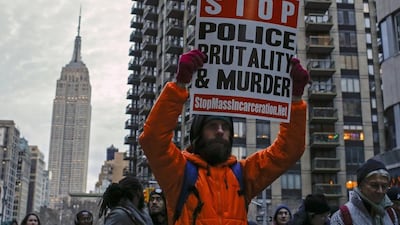NEW YORK // Tens of thousands of protesters gathered in New York, Washington and Boston on Saturday, stepping up demonstrations across the United States demanding justice for black men killed by white police.
The rallies in New York, Boston and in several Californian cities were among the largest in a growing protest movement sparked by the killing of unarmed black teenager Michael Brown in Ferguson, Missouri on August 9.
Grand jury decisions not to prosecute the white officers responsible for 18-year-old Brown’s death and a fatal chokehold on Eric Garner – a New York father of six – in July, have triggered weeks of protests.
The protests were largely peaceful, although police in Boston said they arrested 23 people who tried to block a highway.
A sea of demonstrators shut down parts of Manhattan and Washington’s Pennsylvania Avenue that leads to the Capitol with cries of “No justice, no peace!”, “Justice Now!” and “The whole damn system is guilty as hell!”
Police in Washington did not provide an estimate of the crowd size, but witnesses say it appeared far larger than the 5,000 people organisers initially said they had expected.
In New York, police said approximately 25,000 took to the streets.
The organisers tweeted that 50,000 people turned out. Their Facebook page had said that 48,000 would take part before the rally began.
The mixed crowds of black and white mobilised not just young people but also families, children, parents and the elderly.
They held aloft banners proclaiming “Stop racist police” and “I can’t breathe” – the last words uttered repeatedly by Garner, as police wrestled him to the ground for allegedly selling untaxed cigarettes in New York’s Staten Island.
A string of deaths at the hands of officers, including that of 28-year-old Akai Gurley in Brooklyn, have inflamed resentment against police tactics in the United States and distrust many blacks feel toward law enforcement.
The families of Garner and Brown were joined in Washington by relatives of 12-year-old Tamir Rice, who was shot dead last month by Cleveland police, and of Trayvon Martin, who was killed in Florida by a neighbourhood watchman in 2012.
Garner’s wife took to the stage before the energised crowd.
“I am here not only for marching for Eric Garner, but for everyone’s daughters and sons and nieces and nephews and dads and moms,” his widow Esaw Garner said.
Garner’s mother Gwen Carr said the protests would continue until lawmakers respond to demands for reform.
“This is a history-making moment,” she said as onlookers erupted in cheers.
“We will come here as many times as it takes,” she told the crowd as they edged toward the US Capitol building that houses Congress.
Civil rights activist Al Sharpton, president of the National Action Network and a prominent figure in the rallies, led the protest march in Washington.
He called for sweeping justice reform.
“You thought it would be kept quiet. You thought you’d sweep it under the rug. You thought there would be no limelight. But we’re going to keep the light on Michael Brown, on Eric Garner, on Tamir Rice, on all of these victims,” he thundered, as the families of those killed joined him on stage, some sobbing.
In New York, protesters shut down a six-kilometre route from Washington Square, down Fifth and Sixth Avenues and Broadway to converge outside police headquarters, filling the air with chants of “Justice now!”
After dark and as temperatures hovered above freezing, they shut down the Brooklyn Bridge as they marched across the river.
“We will shut New York City down,” organisers said over loudspeakers as the crowd started to stream out of Washington Square.
Members of the throng carried black cutouts of human figures bearing the words “RIP” along with the names of those killed by police, while others shouted: “Justice now! The whole damn system is guilty as hell.”
Bartender Cole Fox, 24, marched with his mother and held a banner reading “Grand Jury Reform Now”.
“Fundamental changes need to be made. It’s just a matter of days before the next person, black or white, is killed,” he said.
Student Rosalind Watson, 21, decried “institutional racism”.
“If one person sees this march and feels more supported and safe, it’ll be a success,” she said.
The atmosphere in New York as elsewhere was defiant but peaceful. Protesters were closely shadowed by police and police helicopters hovered overhead.
In Boston, Massachusetts State Police said several people were arrested and some roads blocked in Boston.
In Berkeley, California, an effigy of a black man hung by a noose was placed outside a university entrance with the words “I can’t breathe” scrawled on its chest.
* Agence France-Presse

